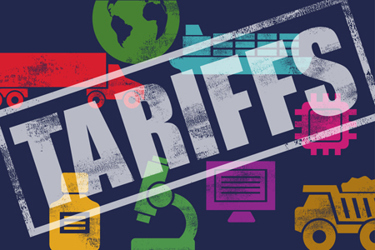The Potential Impact Of U.S. Tariffs On The Biotech Sector: Manufacturing, Funding, And Clinical Trials
By Raymond Forslund, Ph.D., MBA, SVP, head of CMC development & project management, Syner-G Biopharma Group

The imposition of tariffs by the United States government has introduced significant uncertainties across various industries, including biotechnology. This white paper examines the potential ramifications of these tariffs on biotech manufacturing, funding, and the localization of clinical trials. Additionally, it evaluates whether there is a discernible trend toward conducting more clinical trials in Europe.
Impact On Manufacturing
Increased Production Costs
A survey conducted by the Biotechnology Innovation Organization (BIO) revealed that nearly 90% of U.S. biotech companies rely on imported components for at least half of their FDA-approved products. The imposition of tariffs on imports from regions such as the European Union (EU), China, and Canada is expected to escalate manufacturing costs. Specifically, 94% of biotech firms anticipate surging manufacturing expenses if tariffs are placed on EU imports, which occurred on April 2, 2025. And while “pharmaceuticals” appear to have been exempted from the reciprocal tariffs announced on April 2, 2025, the details, scope, and potential impact of the exemption are still not fully understood.
Supply Chain Disruptions
Tariffs can disrupt established supply chains, compelling companies to seek alternative suppliers or relocating manufacturing facilities. Such transitions are neither swift nor cost-effective. According to the BIO survey, 80% of biotech firms would require at least 12 months to find alternative suppliers, with 44% needing more than two years. This prolonged adjustment period could delay the production and availability of essential medical products.
Reshoring Initiatives
In response to tariff pressures and governmental incentives, some pharmaceutical companies are investing in domestic manufacturing. For instance, Johnson & Johnson announced plans to invest over $55 billion in building new manufacturing plants in the United States over the next four years. Similarly, Eli Lilly plans to invest $27 billion to build four new U.S. plants. While these initiatives may bolster domestic production, they require substantial capital and time to become operational, potentially leading to short- to medium-term supply challenges.
Impact On R&D Funding
Investor Uncertainty
The introduction of tariffs contributes to an unpredictable economic environment, which can deter investment in the biotech sector. Political uncertainties and shifting policies, such as tariffs and drug pricing reforms, have been cited as factors stalling large pharmaceutical and biotech deals. This hesitancy among investors can impede the flow of capital necessary for research and development
Increased Operational Costs
Higher manufacturing costs resulting from tariffs may strain the financial resources of biotech companies, particularly small and medium-sized enterprises (SMEs). These increased expenses could lead to reduced budgets for research and development, potentially delaying innovation and the introduction of new therapies.
Impact On Location Of Clinical Trials
Cost Considerations
The increased costs associated with tariffs may influence decisions regarding the location of clinical trials. Sponsors might seek to conduct trials in regions with lower operational expenses to mitigate financial pressures. Europe, with its established infrastructure and favorable regulatory environment, could become a more attractive destination for clinical trials.
Supply Chain Stability
Conducting clinical trials requires a stable supply of investigational products and medical devices. Tariffs that disrupt supply chains may lead sponsors to consider locations where such disruptions are minimized. Europe's integrated market and proximity to manufacturing hubs may offer advantages in this context.
Regulatory Environment
The European Medicines Agency (EMA) provides a centralized procedure for drug approval, which can be advantageous for companies seeking access to multiple markets. This regulatory efficiency, combined with potential cost savings, may contribute to a trend of conducting more clinical trials in Europe.
Evaluating the Trend Toward Europe
While there is anecdotal evidence suggesting a shift toward conducting more clinical trials in Europe, comprehensive data to confirm a definitive trend is limited. Factors such as cost, regulatory efficiency, and supply chain stability make Europe an attractive option. However, the decision to relocate clinical trials is multifaceted, involving considerations of patient demographics, disease prevalence, and specific study requirements. Therefore, while tariffs may influence trial localization decisions, they are one of many factors in a complex decision-making process.
Conclusion
The imposition of U.S. tariffs has the potential to significantly impact the biotech sector by increasing manufacturing costs, disrupting supply chains, and creating investor uncertainty. While some companies are investing in domestic manufacturing to mitigate these effects, such transitions require considerable time and resources. The increased operational costs may also influence the localization of clinical trials, with Europe emerging as a potentially more attractive destination due to its cost advantages and regulatory environment. However, the decision to conduct trials in Europe is influenced by multiple factors, and a clear trend has yet to be established. Addressing these challenges requires more than just reactive measures. It calls for a strategic, integrated approach grounded in scientific insight and operational precision.
About The Author:
 Raymond E. Forslund, Ph.D., MBA, is a biotech and pharmaceutical operations executive with over 20 years of experience helping biopharma companies accelerate product development and drive business growth. As executive vice president and head of product development at Syner-G Biopharma Group, he expanded the company's technical services division, growing revenues from startup to over $45 million. Raymond excels at translating scientific innovation into practical, efficient execution across R&D, QA, and project management. He is the innovator behind CMC 360™, a fixed-fee platform that streamlines CMC development through process optimization and risk-based strategies. With prior senior leadership roles at Laurus Synthesis and Ironwood Pharmaceuticals, Raymond focuses on providing expert guidance, reliable support, and innovative solutions that help clients succeed in a competitive market. He holds a Ph.D. in organic chemistry from UIC, an MBA from Babson College, and a B.A. from Hamilton College, and actively contributes to the American Chemical Society.
Raymond E. Forslund, Ph.D., MBA, is a biotech and pharmaceutical operations executive with over 20 years of experience helping biopharma companies accelerate product development and drive business growth. As executive vice president and head of product development at Syner-G Biopharma Group, he expanded the company's technical services division, growing revenues from startup to over $45 million. Raymond excels at translating scientific innovation into practical, efficient execution across R&D, QA, and project management. He is the innovator behind CMC 360™, a fixed-fee platform that streamlines CMC development through process optimization and risk-based strategies. With prior senior leadership roles at Laurus Synthesis and Ironwood Pharmaceuticals, Raymond focuses on providing expert guidance, reliable support, and innovative solutions that help clients succeed in a competitive market. He holds a Ph.D. in organic chemistry from UIC, an MBA from Babson College, and a B.A. from Hamilton College, and actively contributes to the American Chemical Society.
